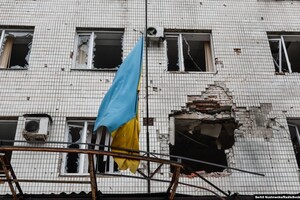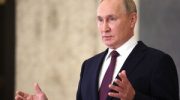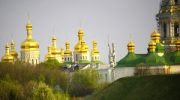Sooner or later, Europe will have to understand that its response to the Russian war will determine the continent's ability to solve other global problems.

At the end of April 2022, in two months after Russia invaded Ukraine , the world realized the depth of change in what war would mean in the future.
Dreams of a quicker solution have evaporated. The war is already surprisingly “normalized”, accepted as a process that will continue indefinitely. The fear of an unexpected and great escalation will hang over our daily lives. In Sweden and other countries, the authorities have advised the population to stock up on provisions to survive the war if necessary.
Slovenian philosopher Slavoj Žižek writes about this in an article for Die Welt, noting that changes in attitudes towards war are observed on both sides of the front. In Russia, talk of global conflict is growing. RT chairman Margarita Simonyan recently said: “Either we lose in Ukraine or the third world war begins. Personally, I think the scenario of World War III is more realistic. “
This paranoia is backed up by insane conspiracy theories about a united “liberal-totalitarian Nazi-Jewish conspiracy” to destroy Russia. Asked how Moscow could talk about “denazification” of Ukraine if its president, Volodymyr Zelensky, is of Jewish descent himself, Russian Foreign Minister Sergei Lavrov said: “I may be wrong, but Hitler also seems to have Jewish blood./strong>. And the fact that Zelensky is a Jew means absolutely nothing. The wise Jewish people say that the fiercest anti-Semites are usually the Jews themselves. “
On the other hand, especially in Germany, a new version of pacifism is emerging. Leaving aside all the sublime rhetoric and focusing on what Berlin is actually doing, a very clear signal emerges: “Given our economic interests and the danger of entering into a military conflict, we must not support Ukraine too much, even if it means its absorption by Russia. ». Germany is afraid to cross the line that Moscow will become “really evil.” But only Vladimir Putin decides where this line runs every day.
Playing on Western pacifist fear is the basis of his strategy, Zyzek said.
Betting on complacency
Of course, everyone wants to prevent the beginning of a new world war. But sometimes excessive caution only encourages the aggressor, who by nature always expects that his victim will not defend himself. Therefore, in order to prevent the beginning of a greater war and to create a certain deterrence, the West must also draw clear lines. But so far he has done just the opposite.
Read also: The war in Ukraine may become more unpredictable and escalating – US intelligence
As Putin was preparing to go to war against Ukraine, US President Joe Biden said his administration wanted to see first what kind of invasion the Kremlin would arrange: “limited” or one that would haunt full occupation. Of course, the conclusion from this statement was that a “minor” act of aggression would be considered permissible.
“Recent changes in attitudes reveal the deep, dark truth about the Western position. If we used to fear that Ukraine would be destroyed quickly, in fact we feared just the opposite: that the invasion would continue indefinitely. It would be much more convenient if Ukraine lost quickly, allowing us to resent, mourn the loss, and then return to business as usual. What was supposed to be good news – a smaller country is unexpectedly and heroically fighting against the brutality of a bigger aggressor – has become a source of problems that we do not know what to do, “- writes Žižek.
Left-wing pacifists in Europe warn against reviving the heroic fighting spirit of previous generations. German philosopher Jürgen Habermas even accused Ukraine of “moral blackmail” of Europe. There is something deeply melancholy in his position. Habermas is well aware that post-war Europe was able to forget about militarism only because it lived for a long time under the safe nuclear umbrella of the United States. But the return of the war to the continent says that this period is over. And unconditional pacifism will require ever deeper moral compromises.
“Unfortunately,” heroic “actions will be needed again, not only to resist or deter aggression, but also to deal with issues such as environmental disasters or famine,” warns Žižek.
Après Le Déluge (After us at least the flood)
In French, the difference between declared and real fear is conveniently embedded in the so-called ne explétif, ie “no”, which in itself means nothing, because it is used for syntactic reasons or because of the requirement of pronunciation. It is usually used in complex contractions after a verb with a negative connotation. In fact, the role of such a “no” is to point out the negative aspect of what is ahead of it. Elle doute qu’il ne vienne, meaning “She doubts he won't come.” Or Je te fais confiance à moins que tu ne me mentes – “I trust you if you don't lie to me”.
Read also: Putin's Russia will not win the war against Ukraine – Scholz The French psychoanalyst Jacques Lacan used the ne explétif example to explain the difference between desire and desire. When a person says, “I'm afraid the storm will not has begun, ”she consciously expresses the wish that the disaster does not begin. But her true desire is contained in the added “no”: “I'm afraid the storm will not start, because I'm secretly fascinated by its power.”
Something like the French ne explétif concerns and Europe's fear of cutting off gas supplies from Russia.
“We are afraid that disruptions in gas supplies will cause an economic catastrophe,” we say. But what if our declared fear is false? What, in reality, are we afraid that cutting off gas supplies will not cause a catastrophe? Eric Santner of the University of Chicago recently put it this way: what if we adapt quickly? Stopping gas imports from Russia will not lead to the collapse of capitalism, but will push for real changes in the European way of life, changes that will be welcomed without being tied to Russia, “Zizek wrote.
Reading ne explétif literally, acting contrary to the declared “no”, is probably the greatest manifestation of political freedom today. For example, the Kremlin's claim that stopping Russian gas imports would be an economic suicide for Europe. But given what needs to be done to make European societies more resilient, wouldn't that be liberation?
“To paraphrase Kurt Vonnegut, we should not go down in history as the first society not to saved itself because it was unprofitable, “explained the Slovenian philosopher.
Whose globalization?
The Western media is flooded with reports of billions of dollars in aid sent to Ukraine. However, Russia still receives tens of billions of dollars for gas exports to Europe. The continent does not even think that it has an extraordinary non-military tool to put pressure on Moscow, which will also benefit the planet's ecology. Moreover, the abandonment of Russian gas will make possible a new kind of globalization that will become a much-needed alternative to both the Western liberal option and the Russian-Chinese authoritarian brand.
Read also: Focus: How much does Putin spend every day on the war against Ukraine?
Russia does not just want to dismember Europe. It also presents itself as an ally of developing countries against Western “neocolonialism.” Russian propaganda exploits the bitter memory of middle-income countries about Western abuses. How is bombing Iraq better than bombing Kyiv? Mosul could be completely destroyed, but Mariupol – no? Of course, while the Kremlin presents itself as a fighter against colonialism, it is sending troops to support dictators in Syria, the CAR and other countries.
Activities of Russian Wagner mercenaries fighting for authoritarian regimes all over the world, make it clear what Russian-style globalization is like.
“When Ukraine proudly declares that it is defending Europe, Russia responds that it is protecting all those who have fallen victim to Europe, both in the past and in the past. and today “, – notes Žižek.
The effectiveness of this propaganda should not be underestimated. Recent polls in Serbia show that for the first time in many years, a majority of voters oppose the country's accession to the European Union. If Europe wants to win a new ideological war, it will have to change its model of liberal-capitalist globalization. Without radical change, there will be a collapse that will turn the EU into a fortress surrounded by enemies ready to invade and destroy it.
“I am well aware of the consequences of the boycott of Russian gas. Our economies will have to reorganize, as in the case of a full-scale war or a similar large-scale catastrophe. And the prospect is not as far away as it may seem. The United Kingdom has already informally restricted the sale of oil due to the war in Ukraine. If Europe refuses gas from Russia, survival will require serious intervention. Russia is counting on Europe's inability to do something “heroic,” the article said.
See the special topic: contingent – SBGS Border guards reported that Russian propaganda channels had distributed a letter written in error. “With each new Bucha, the desire to talk to Russia disappears”: Zelensky explained what should happen by the end of the war Ukrainian president assured that despite all the actions of Russian troops atrocities, Kyiv is still ready for dialogue. Six captured occupiers received sentences in Ukrainian courts – SBU Convicted occupiers were taken prisoner in March-February. Putin will fight to the last Buryat – diplomat According to the expert, the President of the Russian Federation will not dare to commit suicide. However, the dictator may be betrayed by his entourage. First of all, special services and the military. DBR investigators have found documents about Russia's plans to seize the entire territory of Ukraine All information will be studied and attached to the case file.


